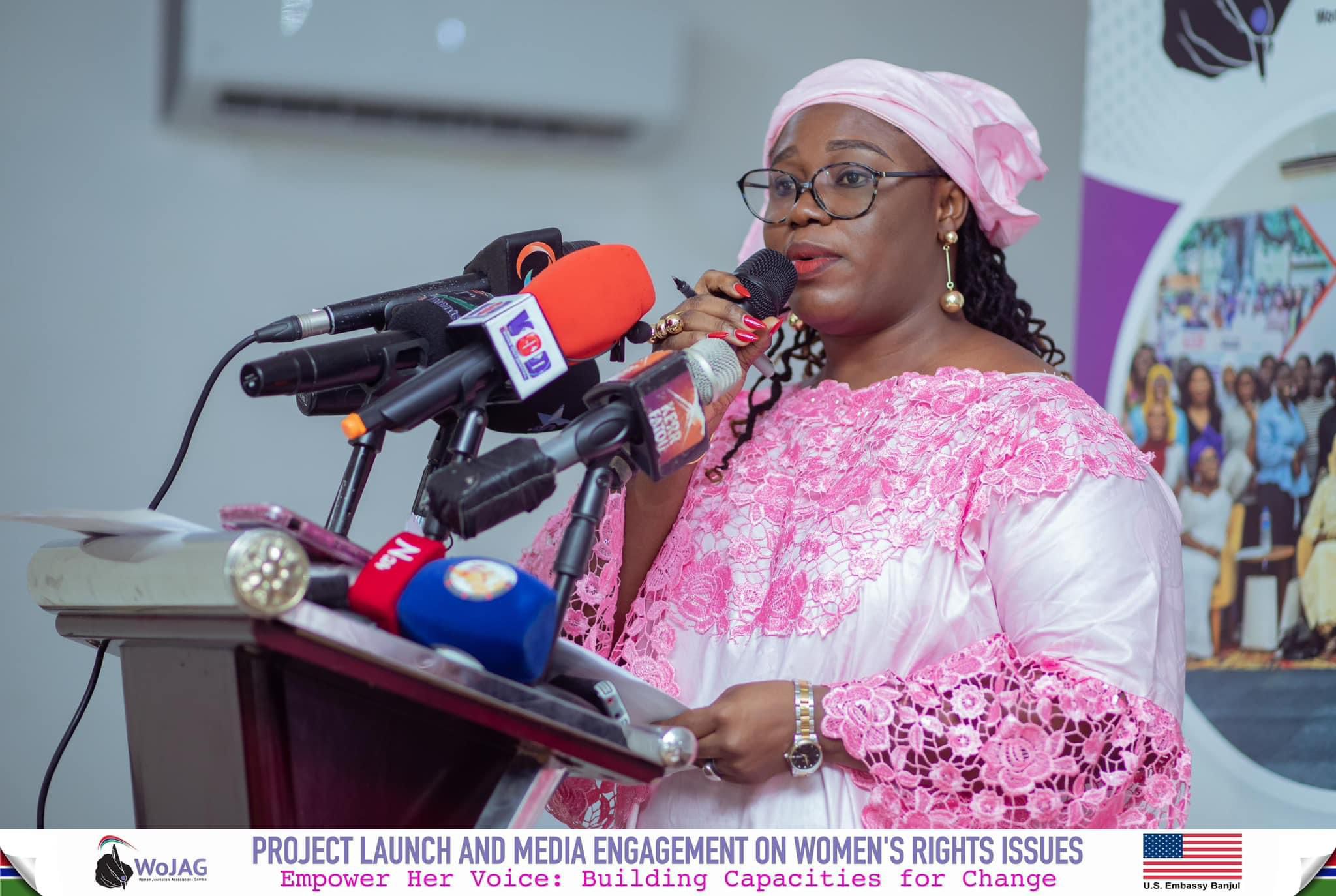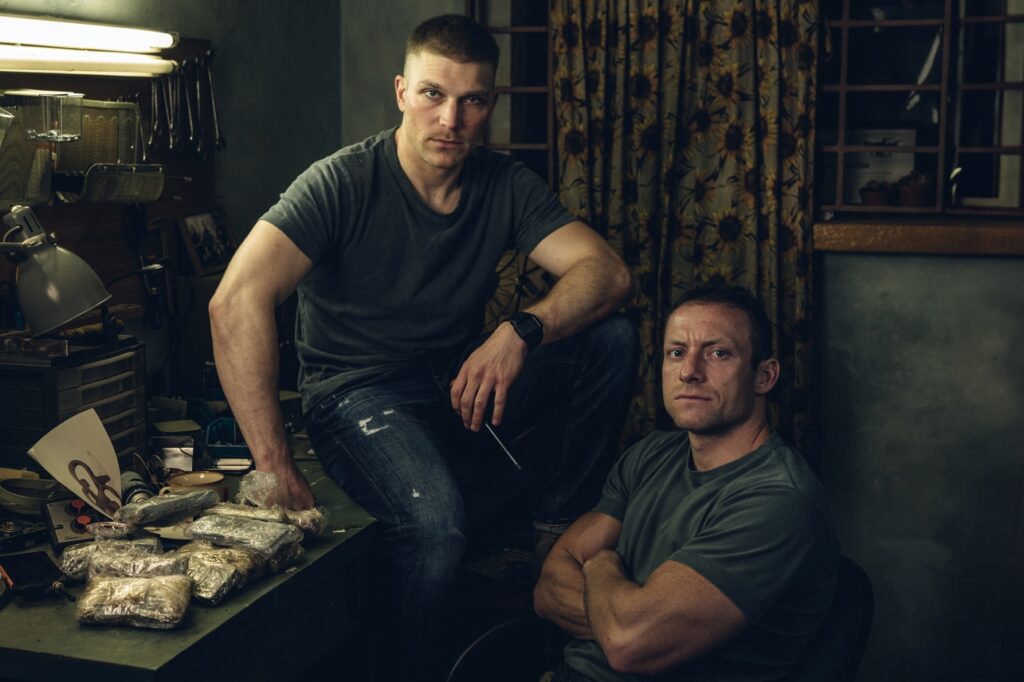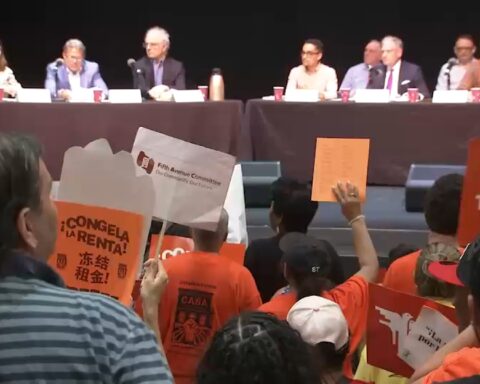By Fatou Dahaba
The Women Journalists Association of The Gambia (WoJAG) launched the ‘Empower Her Voice’ project, worth fifteen thousand US Dollars ($ 15,000), at Paradise Suites Hotel on Thursday, October 31st, 2024.
‘Empower Her Voice’ project aims to address the critical issue of women’s rights by empowering women journalists through training and resources to amplify the voices of vulnerable women and girls affected by Female Genital Mutilation (FGM) and advocate for broader women’s rights. This project, supported by a grant proposal, underscores women journalists’ role in raising awareness and driving positive change in The Gambia.
The event reflects WoJAG’s continued dedication to fostering gender equality in journalism.
Annette Camara, president of the Women Journalists Association, said this is the first and largest initiative in WoJAG’s history, and it is significant for women in the journalism industry and beyond.
Annette Camara, president of the Women Journalists Association,
She added that the project seeks to strengthen the capacities of women journalists to break gender stereotypes and create a more balanced representation of women and girls in the media. This initiative’s key
According to her, the key objectives include training women journalists in ethical reporting, gender-sensitive reporting storytelling, and digital media skills to effectively cover FGM and women’s rights issues and Increase their capacity to report ethically and effectively on these issues.
‘Provide reporting grants and technical support for women journalists to conduct in-depth investigations and produce impactful stories on SGBV, SHR, and impact on vulnerable women and girls. Publication of powerful stories that raise awareness, challenge stereotypes, and advocate for policy changes on FGM and women’s rights, among others.’
She further highlights the need to fight for gender equality, dignity, and respect for all Gambians, which demands unified voices and relentless action. ‘Today, we affirm our commitment to standing in solidarity with each other and to supporting and empowering every woman who dares to tell her story, challenge the status quo, and inspire change.’
Sharon Cromer, US Ambassador to The Gambia, said women and girls around the globe and here in the Gambia are hindered from accomplishing their goals and reaching their potential.
Sharon Cromer, US Ambassador to The Gambia
She pointed out that when women are underrepresented in the media, their voices are muted, and they are less likely to be featured in news stories or to be experts in news stories. The gender imbalance in media perpetuates harmful gender stereotypes because no one is telling stories from a female perspective, she noted.
‘Female journalists are often the target for sexual harassment, threats, and violence, said Ambassador Cromer. ‘Despite these challenges you, the members of the Women Journalists Association perceive, this is why we support you.’
She said the empowerment of women and girls is a top priority for the US government, and ’empower her voice’ is one example of the US’s dedication to this goal. However, she added, ‘It is more than just a project; it is a step towards amplifying the voices of vulnerable women and girls.’
Fatou Jagne Senghor, a Human Rights Activist and keynote speaker, reiterates that the media has significant power to transform society and plays a crucial role in helping society achieve gender equality.
Fatou Jagne Senghor, a Human Rights Activist
She disclosed that investing in gender-sensitive transformative content could be a way to break gender stereotypes, close the inequality gap, and address discrimination.
Madam Jagne Senghor outlined that only independent media with competent, committed, and experienced journalists can challenge traditional and cultural norms and attitudes regarding gender perception both in the content and media houses interns of representation.
‘By showing and imposing women in leadership roles and as experts in a diversity of topics on a daily basis, the situation can be improving.’
She highlighted that women journalists in the Gambia have a huge role to play in championing this cause. ‘This could be done through partnerships, awareness raising, and, importantly, improving human resource capacity.’
She challenged women journalists to train themselves as specialists so that they can reach decision-making levels and make necessary changes in the future.
Bakary Y. Badjie, Minister of Youth and Sport, underscores the importance of the project, which aims to equip Gambian women journalists with skills to advocate for women’s rights and address sexual and Gender-Based Violence (SGBV).
Bakary Y. Badjie, Minister of Youth and Sport
He highlighted the project’s goal to empower women journalists with essential tools like ethical reporting, digital storytelling, and advocacy on SGBV and girls’ rights.
“The Women Journalists Association is deeply committed to amplifying the voices of women and girls in The Gambia,” said Minister Badjie. “Your work is vital as we aim to enhance the visibility and representation of women across all fields, including sports. Through your storytelling efforts, we can raise awareness and create a safer, more inclusive society.”
Isatou Keita, Vice President of the Gambia Press Union, Said ‘Empower Her Voice’ isn’t just about helping women journalists do their jobs but also about giving them the support they need to tell the stories that matter—stories that expose injustice, challenge harmful practices like FGM, and fight for the rights of vulnerable women and girls.
Isatou Keita, Vice President of the Gambia Press Union
At the Gambia Press Union, she said they believe that empowering women in journalism strengthens everyone. ‘They’re committing to a future where every story, issue, and voice has a place in the media. We’re here to encourage each other, to raise each other up, and to ensure that the voices of women and girls in The Gambia are heard.’ she said.
The post WOJAG Launches Project Worth $15,000 To Empower Women Journalists appeared first on The Alkamba Times.








